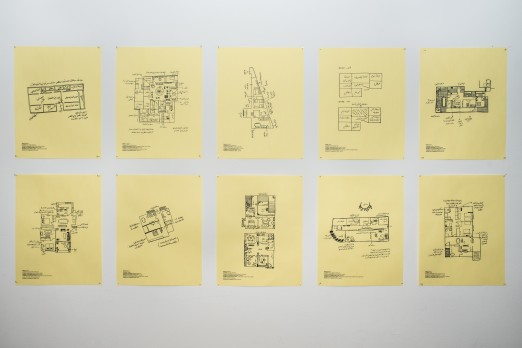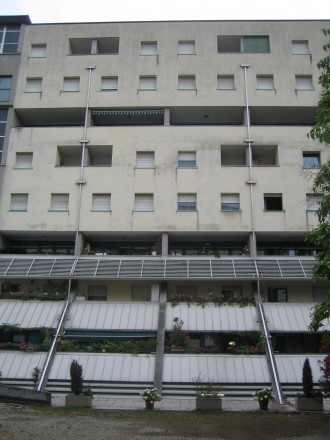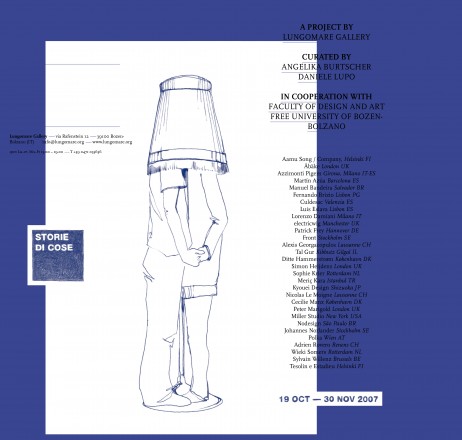DIFFERENCE AS POTENTIAL – 22.10.2019 – 7 pm – FOUNDLAND

Also this year Lungomare proposes the series of talks, workshops and performances: Difference as potential.
With this program Lungomare focuses on the idea of the city as a social space. We think of the city and its shared places as a tool that can make visible the transformations that currently take place in our society, as a place of contact and meeting between different cultures and people, a place where difference becomes a protagonist. The events represent an opportunity for exchange and discussion with artists, architects and designers to question the urban spaces that are transformed and radicalized, making aspects such as the concept of “other”, “identity”, “belonging” and “hospitality” weak.
22.10.2019
7 pm
with Lauren Alexander
The second appointment with Foundland Collective, formed in 2009 by South African Lauren Alexander and Syrian Ghalia Elsrakbi.
Since 2014 is based between Amsterdam and Cairo.
The duo collaboration explores under represented political and historical narratives by working with archives via art, design, writing, educational formats, video making and storytelling. Throughout their development, the duo has critically reflected upon what it means to produce politically engaged work from the position of non-Western artists working between Europe and the Middle East.
Foundland was awarded the Smithsonian Artist Research Fellowship for research in the largest Arab American archive in 2015/2016 and was shortlisted for the Dutch Prix de Rome prize in 2015 as well as the Dutch Design Awards in 2016. In 2017 their short video, “The New World, Episode One” premiered at the Centre Pompidou, Paris and in 2018 was screened at the Rotterdam International Film Festival. The duo have lectured and exhibited widely in Europe, the United States and the Middle East including at ISPC, New York, Ars Electronica, Linz, Impakt Festival and BAK, Utrecht, London Art Fair, Beursschouwburg, Brussels, Fikra Biennial, Sharjah and Tashweesh Feminist Festival, Cairo and Brussels. Several of Foundland’s video works are preserved and distributed by the Dutch media art archive LIMA, Amsterdam.
TALK
Memory Archives for the Future
Foundland Collective aims to develop analytical and unconventional research methods to understand, interpret and map complex events around us, particularly related to situations of conflict and migration. Through a reflection on several projects by Foundland Collective dealing with archival material, we will discuss the relevance of documenting and interpreting personal collections.
What´s on
EXHIBITION :: Binta Diaw :: Collective Practices – A Living Experience of Feeling ListenedAbout Lungomare
Lungomare, a cultural association founded in Bolzano in 2003, was created from the desire and necessity to open a space in which to share differences, experiences, opinions and desires, a space in which to make the link between cultural production and the political and social dimension. Lungomare undertakes projects that investigate and test possible relationships between design, architecture, urban planning, art and theory, the results of which are presented in different formats: public discussions, conferences, publications, exhibitions and interventions in public spaces. All these formats are characterised by the intention to interact with cultural and socio-political processes relating to the region in which Lungomare is located.
Currently Lungomare’s activities focus on long-term residency projects, a format whereby Lungomare invites guests to engage and interact within the context of South Tyrol. Lungomare’s activities are based on three principles: specific attention to the context in which the association’s projects are undertaken, the transdisciplinary approach that distinguishes these projects, and reflection on the role of Lungomare as a cultural institution in connection with the region in which it operates.
Territory
Lungomare is located at the edge of Bolzano, the capital of South Tyrol, and relates to the context in which it operates, attempting to highlight the dynamics of change. Large urbanized areas alternate with broad areas of intensive cultivation and yet others of picturesque landscape, all of which penetrate the centre of the city. The city is surrounded by mountains and this is one of the reasons why the tourism industry has become a driving force in this locality. The demographic structure of the city has been characterized for a long time by the coexistence of two populations, those speaking German and those speaking Italian. However, the social and demographic composition of Alto Adige Südtirol is changing. Migrants, including those from non-European countries are making their way to the area to settle, whilst others, including political refugees, are flowing through the region.



